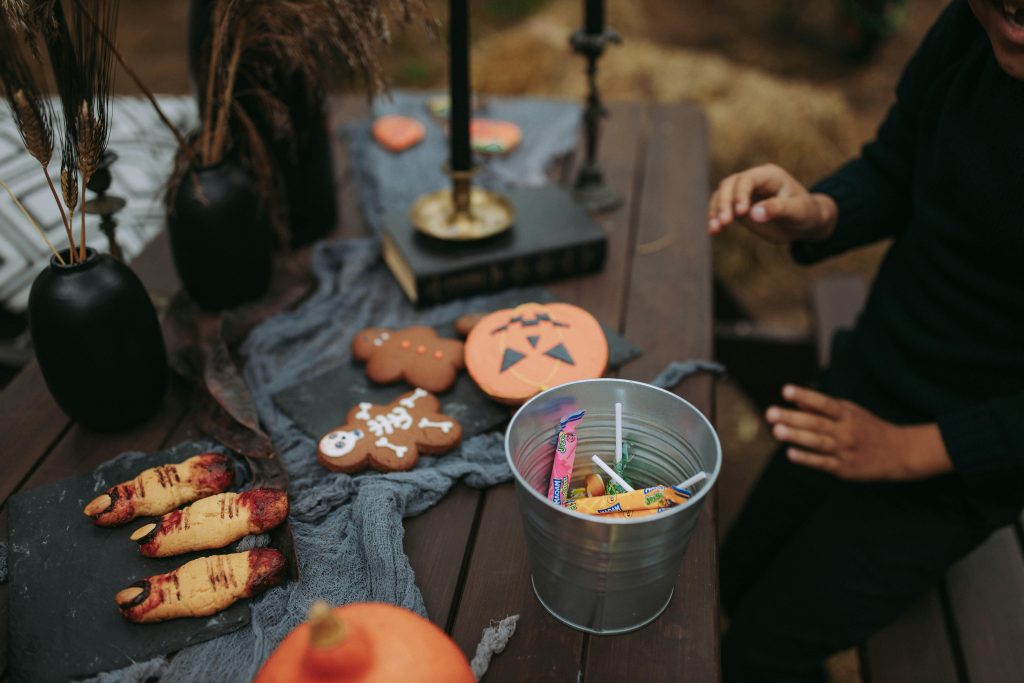Halloween Food Safety
Posted in Food Safety,Our Blog on October 24, 2024

Halloween– The most officially unofficial holiday ever. A day that we absolutely love to get dressed up, head out to parties and most importantly collect that parent tax on the mass amounts of candy that kids receive. Today we look at some Halloween candy food safety and how it affects everyone equally no matter how you plan to spend the day.
- Snacking: Children shouldn’t snack on treats from their goody bags while they’re out trick-or-treating. Give them a light meal or snack before they head out – don’t send them out on an empty stomach. Urge them to wait until they get home and let you inspect their loot before they eat any of it.
- Safe treats: Tell children not to accept – and especially not to eat – anything that isn’t commercially wrapped. Inspect commercially wrapped treats for signs of tampering, such as an unusual appearance or discoloration, tiny pinholes, or tears in wrappers. Throw away anything that looks suspicious.
- Food Allergies: If your child has a food allergy, check the label to ensure the allergen isn’t present. Do not allow the child to eat any home-baked goods he or she may have received.
- Choking hazards: If you have very young children, be sure to remove any choking hazards such as gum, peanuts, hard candies, or small toys.
What about bobbing for apples?
- Reduce the number of bacteria that might be present on apples and other raw fruits and vegetables by thoroughly rinsing them under cool running water. As an added precaution, use a produce brush to remove surface dirt.
- Try this new spin on apple bobbing from FightBAC.org: Cut out lots of apples from red construction paper. On each apple, write activities for kids, such as “do 5 jumping jacks.” Place a paper clip on each apple and put them in a large basket. Tie a magnet to a string. Let the children take turns “bobbing” with their magnet and doing the activity written on their apple. Give children a fresh apple for participating.
What if you are partying at home?
- Beware of spooky cider! Unpasteurized juice or cider can contain harmful bacteria such as Salmonella. To stay safe, always serve pasteurized products at your parties.
- No matter how tempting, don’t taste raw cookie dough or cake batter that contain uncooked eggs or unbaked flour.
- “Scare” bacteria away by keeping all perishable foods chilled until serving time. These include finger sandwiches, cheese platters, fruit or tossed salads, cold pasta dishes with meat, poultry, or seafood, and cream pies or cakes with whipped-cream and cream-cheese frostings.
- Bacteria will creep up on you if you let foods sit out too long. Don’t leave perishable goodies out of the fridge for more than two hours (1 hour in temperatures above 90°F).
Other helpful Halloween hints from the FDA:
Choosing to change the look of your eyes with contact lenses could cause a lot of damage to your eyesight if you get them without the input of your eye care professional.
Decorative contact lenses are not “one size fits all.” An eye doctor (ophthalmologist or optometrist) must measure each eye to properly fit the lenses and evaluate how your eye responds to contact lens wear. A poor fit can cause serious eye damage, including:
- scratches on the cornea (the clear dome of tissue over the iris — the part of the eye that gives you your eye color)
- corneal infection (an ulcer or sore on the cornea)
- conjunctivitis (pink eye)
- decreased vision
- blindness
Face paints can be fun on Halloween and other special occasions. Make sure your painted-on designs don’t cause problems like leaving you with a rash, swollen eyelids, or other reaction.
- Follow all directions carefully.
- Don’t decorate your face with things that aren’t intended for your skin.
- If your face paint has a very bad smell, this could be a sign that it is contaminated. Throw it away and use another one.
- Like soap, some things are OK on your skin, but not in your eyes. Some face paint or other makeup may say on the label that it is not for use near the eyes. Believe this, even if the label has a picture of people wearing it near their eyes. Be careful to keep makeup from getting into your eyes.
- Even products intended for use near your eyes can sometimes irritate your skin if you use too much.
- If you’re decorating your skin with something you’ve never used before, you might try a dab of it on your arm for a couple of days to check for an allergic reaction BEFORE you put it on your face. This is an especially smart thing to do if you tend to have allergies.
For more information that we find helpful in preparing for Halloween keep an eye on Make Food Safe for your one stop food safety spot.
